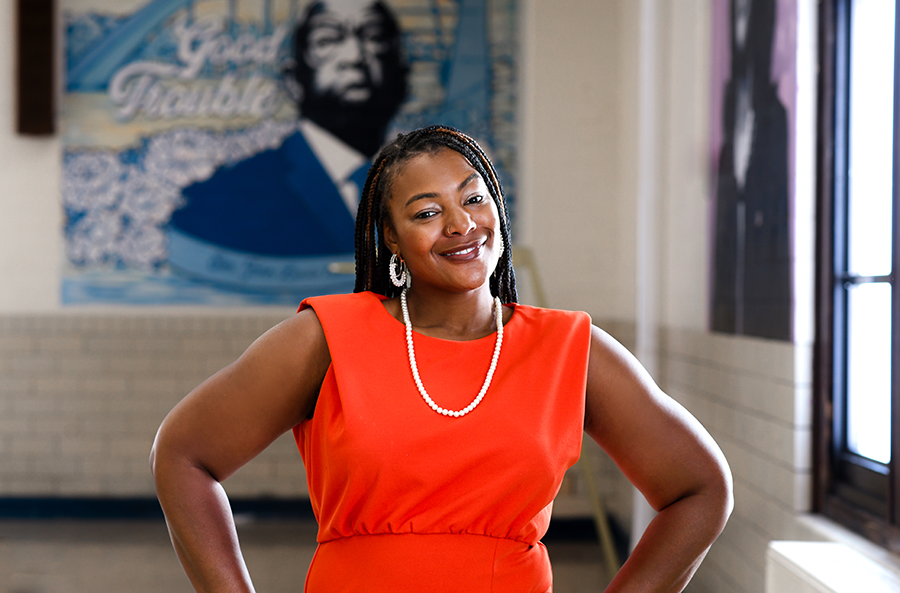Shavonne McMillan

Teach For America Greater Philadelphia, 2005
Principal, Vaux Big Picture High School
Today, Philadelphia-area high schools aim to send as many students as possible off to higher education. But when Shavonne McMillan first became a principal in 2015 at Foundation Academies in Trenton, NJ, knowing 70 percent of her students were going to college didn’t ease her mind. Instead, she discovered, it made her restless. “I always wondered about those other 30 percent,” she says.
Out of that restlessness her own mission emerged, nuanced, clear and urgent: to help students achieve financial independence. “Just because you go to college doesn’t mean that you have economic freedom,” she says.
McMillan initially came to Philly in 2005 as a Teach For America corps member at Simon Gratz High School, where she discovered that she had a passion for preparing students for life through education. She has remained in education since that time, as a teacher, teacher leader, and ultimately school principal. In 2019 she was looking to join an institution where she could catalyze sustainable futures and not just college acceptances. She found her match at Vaux Big Picture High School in Sharswood, where students enter the school’s doors with a set of extraordinary challenges, and—thanks to McMillan’s and her team’s work—leave four years later with a plan tailored not only to success, but to their passions.
In her mission to prepare students for sustained success, McMillan knows she has to make her students believe one thing: “They can access anything—they just have to want it and believe it,” she says. “Too many of our students don’t know that.” And, based on her reflections of her own past, she’s discovered that it starts with discovering a passion.
Fighting for Education
Throughout her life, McMillan followed a passion for learning, and it ultimately brought her to a feeling of affirmation that has fueled her work ever since. It started with her mother, who pushed for McMillan to be placed into public schools that could meet her needs, despite school district zoning limitations.
McMillan later used that strength she inherited to push back on baseless judgment from high school guidance counselors—not to mention historic Black exclusion—and pursue her desire to go to a historically Black university.
“There was this misconception and a blatant lie that [Morgan State University] wouldn’t prepare me for the real world,” she says. Discovering that misconception for herself through her success in school and her preparedness for challenging pursuits like running her own classroom with Teach For America helped McMillan feel affirmed in her passion, and uncovered her ability to overcome. “I think it was a rite of passage for me,” she says. “I want that for other students.”
That’s why McMillan’s work at Vaux begins with discovering students’ passions—because if a student pursues what they want to pursue, as with her lifelong desire to learn where she wanted to learn, McMillan hopes they’ll discover that the affirmation will follow.
The Personal Plan
Although it significantly defines each student’s experience and life plan, the focus on students’ passions is just the tip of the iceberg in terms of McMillan’s work at Vaux. McMillan and the faculty at Vaux follow up on these passions and talents through groundbreaking programming that continuously supports students and culminates in a specific plan for the future.
Over the course of their years at school, students are guided by teachers to discern their plan. “Every student has to have that, and they actually start that planning in the ninth grade,” McMillan says. The plan involves goals that span from social and academic, from behavioral to post-secondary. Then, there’s accountability: “They meet periodically to check the progress on those goals,” McMillan says.
In terms of post-secondary interests, students participate in programs through “Real World Learning” to get a sense of what path will work best for them—whether it’s in the workforce, at college, or at a certificate-granting program.
Thanks to Vaux’s unique programming, students are also now required to complete a Real World Learning internship in order to graduate. For example, students may opt to leave campus and learn from mentors and workers who are not certified teachers, but professionals in different industries.
Students also have access to diverse resources for behavioral and mental health. Whereas most high schools provide only a guidance counselor for a wide range of issues, Vaux provides specialized professional resources so that students are getting the type of attention and advice they need, whether they’re struggling with career discernment or life outside school walls.
That multidisciplinary support has been crucial, McMillan says, in the recent battle with COVID-19 and a simultaneous uptick in gun violence—which she says has even reared its head just across the street. Even now, McMillan says, the issue is clear and present. “It’s constant,” she says. “I didn’t realize how many students were directly exposed to it.”
It’s the combination of Vaux students’ socioeconomic, systemic, and personal histories that motivate McMillan to employ her most valued leadership principles every day: listening, empathizing while empowering, and being humble.
“As an educator, you have to see the system for what it is, and try to break down barriers and create opportunities—but also listen,” she says. “I don’t have all the answers. I always ask for feedback.”
It’s those same principles that have allowed her to lead effectively and increase Vaux’s teacher retention, even giving teachers the opportunity to discover their own passion for leadership—it’s the same uplifting instinct that allows Vaux students to see their promise.
McMillan’s leadership supports students in realizing their potential and obtaining financial freedom. “I fight the good fight every single day for these babies,” McMillan says.